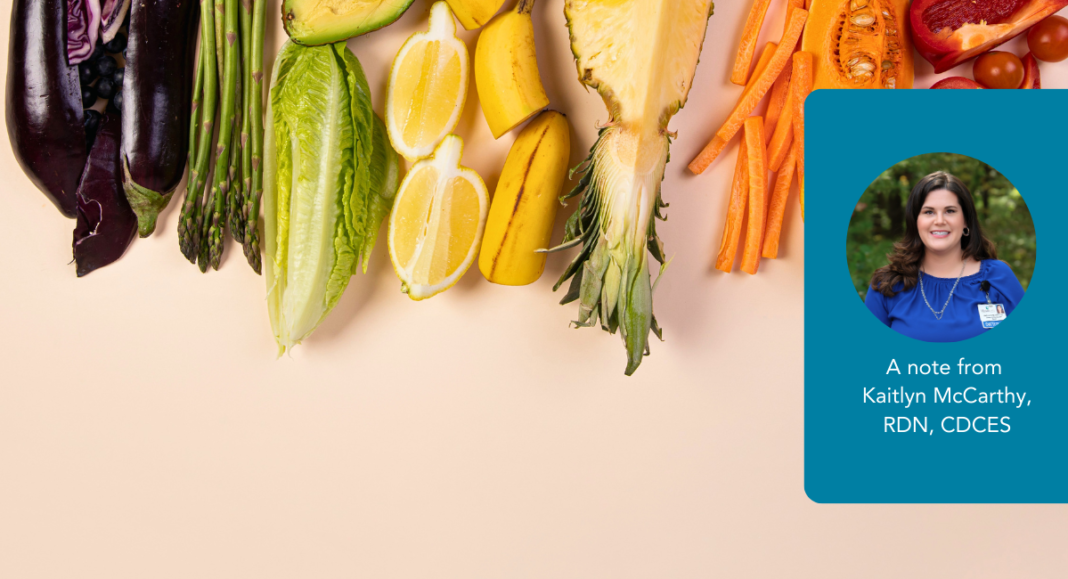As we age, our nutritional needs evolve, and maintaining a balanced diet becomes more important than ever. Proper nutrition is essential not only for sustaining energy but also for protecting against chronic diseases and supporting overall vitality. For seniors, making mindful food choices can greatly improve quality of life, and it all starts with understanding the nutrients your body needs to thrive.
With expert insights from dietitian Kaitlyn McCarthy, RDN, CDCES, we’ll explore key dietary strategies that promote healthy aging, prevent common age-related health issues, and help seniors stay active, energized, and well.
1. Embrace Nutrient-Dense Foods
As we grow older, the body requires fewer calories, but the need for essential nutrients increases. Nutrient-dense foods, such as fruits, vegetables, lean proteins, and whole grains, are rich in vitamins and minerals that support crucial body functions, from brain health to immune system strength.
Incorporating a variety of colorful fruits and vegetables into your diet provides a wealth of antioxidants, vitamins, and fiber. These nutrients are vital for maintaining cognitive function, fighting inflammation, and boosting overall energy. For instance, dark leafy greens like spinach and kale are rich in calcium and iron, which contribute to bone health and prevent fatigue, while berries like blueberries offer antioxidants that combat the effects of aging.
Scientific Insight: Diets that are rich in fruits and vegetables, along with other nutrient-dense foods, have been linked to longevity and reduced inflammation, which in turn lower the risk of chronic diseases such as heart disease, diabetes, and cognitive decline.
2. Boost Calcium and Vitamin D Intake
Maintaining bone health is a priority for seniors, and the best way to do that is by ensuring an adequate intake of calcium and vitamin D. As we age, bone density naturally decreases, increasing the risk of fractures and conditions like osteoporosis. Calcium-rich foods such as dairy products (milk, cheese, yogurt) and fortified plant-based milks, along with exposure to sunlight, can help fulfill your daily calcium and vitamin D needs.
Scientific Insight: Consuming enough calcium and vitamin D is essential for reducing the risk of osteoporosis and fractures in seniors. These nutrients help maintain bone strength and prevent bone loss.
3. Limit Processed Foods
Processed foods are often high in unhealthy fats, sugar, and sodium, all of which can contribute to heart disease, high blood pressure, and cognitive decline. Seniors, in particular, should limit their intake of these foods. Instead, opting for whole, unprocessed foods provides healthier fats, lean proteins, and a variety of vitamins and minerals without the empty calories and harmful additives found in processed snacks, canned foods, and ready-made meals.
Scientific Insight: Diets high in processed foods are associated with faster cognitive decline and an increased risk of chronic conditions, including heart disease and diabetes. By reducing processed food consumption, seniors can improve their overall health and maintain mental clarity.
4. Stay Hydrated
Proper hydration is an often-overlooked aspect of senior nutrition. As we age, our sense of thirst diminishes, and dehydration becomes a common issue. Dehydration can lead to a range of problems, including fatigue, joint pain, constipation, and even cognitive impairment. Drinking adequate water throughout the day is crucial for joint lubrication, digestion, and overall cellular function.
Scientific Insight: Staying hydrated helps support cellular health, reduces fatigue, and aids in digestion, making it essential for seniors to drink sufficient water. Aim for at least 6-8 cups of water a day, adjusting for activity levels and weather conditions.
5. Incorporate Omega-3 Fatty Acids
Omega-3 fatty acids are essential for brain and heart health, and they have anti-inflammatory properties that benefit the body in many ways. Found in fatty fish like salmon, walnuts, and flaxseeds, omega-3s have been shown to improve cognitive function, reduce inflammation, and lower the risk of heart disease. Seniors can boost their omega-3 intake by including these foods in their weekly diet.
Scientific Insight: Research indicates that omega-3 fatty acids help improve cognitive function in seniors and reduce the risk of cardiovascular diseases, making them an important addition to any aging diet.
6. Focus on Fiber
Fiber plays a critical role in maintaining digestive health, especially as we age. Constipation and other digestive issues are common in older adults, and a diet rich in fiber can help alleviate these problems. Whole grains, legumes, fruits, and vegetables are excellent sources of fiber. Incorporating fiber into your daily meals not only supports healthy digestion but also helps regulate blood sugar levels, which is especially important for those managing diabetes.
Quick Tip: Fiber-rich foods, such as lentils, beans, and whole grains, can help stabilize blood sugar levels and keep you feeling full longer. This promotes overall health and can aid in weight management.
7. Plan Ahead for Success
Good nutrition doesn’t happen by accident—it requires planning and consistency. Preparing meals in advance and making healthier choices at the grocery store can set seniors up for success. Stocking the kitchen with fresh fruits, vegetables, whole grains, and lean proteins ensures that nutritious options are always available, making it easier to avoid unhealthy temptations. Additionally, meal prepping can save time and stress, especially for those with limited energy or mobility.
8. Consider Supplements as a Last Resort
While it’s always best to get your nutrients from food, there are times when supplements may be necessary. For seniors with dietary restrictions or specific health conditions, supplements like vitamin D, calcium, or omega-3s may be beneficial. However, it’s important to consult a healthcare provider before starting any supplements to ensure they’re appropriate for your individual needs.
Conclusion
Healthy aging begins with smart, nutrient-dense food choices. By incorporating a variety of whole, unprocessed foods into your daily routine, seniors can enjoy improved energy, better mental clarity, and a lower risk of chronic health conditions. Remember, small changes—like staying hydrated, eating more fiber, and adding nutrient-rich foods to your plate—can make a significant difference in your overall well-being.
As Kaitlyn McCarthy, RDN, CDCES, emphasizes, “Nutrition is about balance—not perfection.” The key to healthy aging is making consistent, mindful choices that support your body’s needs over time. By focusing on what you can control in your diet, you’re taking an important step toward living a vibrant and active life.
Healthy aging is a journey, and it starts with the food you choose to fuel your body. Make every bite count!
4o mini



